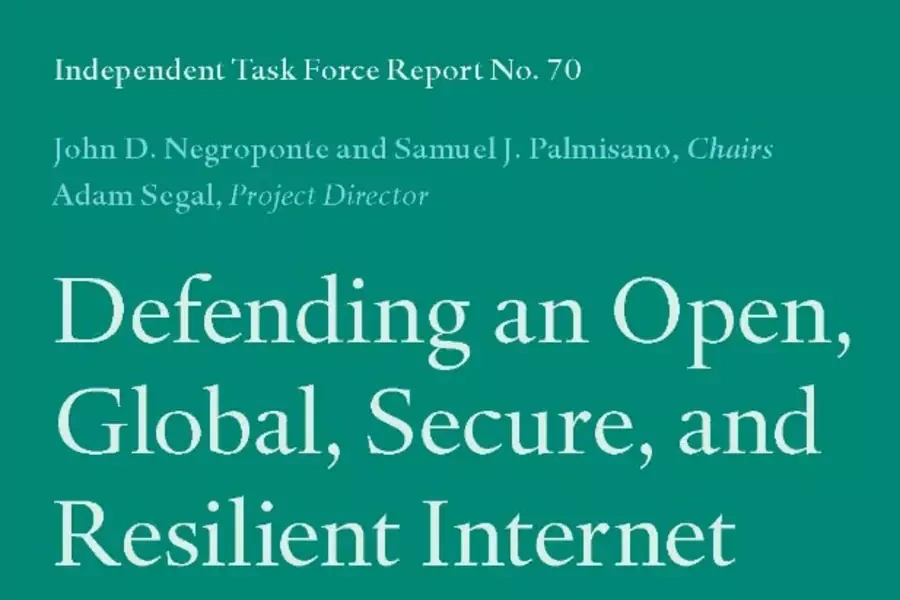Defending an Open, Global Internet: China Is Not the Only Challenge, But Is a Big One

Yesterday the Council on Foreign Relations released a new Task Force Report, "Defending an Open, Global, Secure, and Resilient Internet." The report, co-chaired by Ambassador John Negroponte, former U.S. director of national intelligence and deputy secretary of state, and Samuel J. Palmisano, former chairman of the board and chief executive officer of IBM, and directed by me, suggests a policy framework based on four pillars. First, it calls on the U.S. government to create a cyber alliance of like-minded actors, including governments, private companies, and NGOs, and to develop a global security framework based on a common set of principles and practices. Second, the Task Force recommends that all future trade agreements contain a goal of fostering the free flow of information and data across national borders while protecting intellectual property and individual privacy. Third, the Task Force urges the U.S. government to articulate and advocate a vision of Internet governance that includes emerging Internet powers and expands and strengthens the multi-stakeholder process. Finally, the report recommends that U.S.-based industry work rapidly to establish an industry-led approach to counter current and future cyberattacks.
The report is not just about China—but not surprisingly, China is often a central actor in the report’s discussion of security, trade and innovation, Internet governance, and the free flow of information. We have heard a lot in the last couple of weeks about what Secretary of Defense Chuck Hagel has called the "growing threat of cyber intrusions, some of which appear to be tied to the Chinese government and military." The Task Force has a number of recommendations about how to deal with cyber economic espionage—multilateral and bilateral pressure; legislation to allow for the quick, two-way sharing of threat information; and counterintelligence on foreign efforts to target specific American companies—but also suggests areas where Washington might be able to engage Beijing, such as developing some of the norms of military conflict in cyberspace.
More on:
In the trade arena, the Task Force notes that while Chinese efforts to promote indigenous innovation attract the lion’s share of negative public attention, Brazil and India have adopted or are developing similar policies to access proprietary code and force technology companies to manufacture locally. The report calls on the United States Trade Representative, working with the European Union and Japan, to continue putting pressure on these three countries. If the pressure is ineffective, the report calls on the government to consider other measures to ensure equitable access to Chinese, Brazilian, and Indian domestic markets.
The Task Force notes that Beijing began preparations for the World Conference on International Telecommunications in Dubai in 2012 close to three years in advance, while the United States did not appoint Ambassador Terry Kramer head of the delegation until August 2012. The United States also has to do more to engage those countries that signed the International Telecommunication Regulations not because they are sympathetic to Chinese, Russian, and Iranian efforts to censor the web, but because they lack real technical expertise. Some of this will be through capacity building, but it may also include discussions about cybersecurity at ad hoc or regional groupings that should include China and other Internet powers.
The issue of the free flow of information may be the most intractable in the bilateral relationship. The Task Force recommends that the United States continue to stress that human rights and freedoms apply in cyberspace and to fund Internet freedom initiatives such as anti-censorship and secure communications technologies. The Task Force also believes that the most powerful argument for Internet openness may be economic, and that the United States should do more to demonstrate that blocking and filtering have a deleterious effect on investment and innovation. For example, in a March 2013 survey of 325 businesses with operations in China conducted by the American Chamber of Commerce in Beijing, 55 percent of the respondents said they saw China’s Internet restrictions as negatively or somewhat negatively affecting their capacity to do business there.
As I noted earlier, the Task Force is not just about China; go read the whole thing. But as the list above shows achieving the vast positive potential of cyberspace, and preventing the negative, requires some level of understanding between the world’s two largest economies.
More on:
 Online Store
Online Store